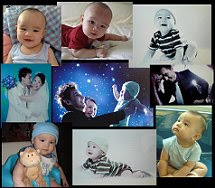Allergies
What's an allergy?
An allergy is an immune reaction to a substance in the environment called an allergen.
When a child with allergies comes into contact with an allergen — either by touching it, breathing it, eating it, or having it injected — her body mistakenly views it as a dangerous invader and releases histamines and other chemicals to fight it off.
These chemicals irritate the body and cause symptoms such as a runny nose, sneezing, itching, and coughing.
Symptoms can be mild or more severe, intermittent (seasonal, for example) or ongoing because of constant exposure to the allergen.
In some cases, an allergen can cause a severe reaction, called anaphylactic shock. This is a medical emergency, as the symptoms — including breathing difficulty and swelling — can be life threatening.
What are examples of allergens?
Possible allergens include food, drugs, insects, animal dander, dust mites, mold, and pollen. Allergens can cause respiratory symptoms, as in nasal allergies or allergic rhinitis, skin symptoms like eczema, or intestinal problems — from food allergies, for example.
What causes nasal allergies?
The most likely culprits in babies and toddlers are:
• Dust mites — microscopic organisms that thrive on human skin flakes. Nearly 85 percent of allergy sufferers are allergic to dust mites.
• Animal dander — those white, flaky specks made up of skin and hair that cats, dogs, and other furry animals shed
• Mold — fungi found in wet, damp places such as bathrooms and basements
Some children are allergic to down and feather pillows, or wool blankets. And while most experts don't think children can be allergic to tobacco smoke, it can certainly make their allergic symptoms worse.
How can I tell if my toddler has nasal allergies or just a cold?
Because the symptoms of nasal allergies are much like cold symptoms — runny nose, watery eyes, cough, nasal congestion, sneezing — it can be tough to tell the difference. There are some telltale signs of allergies, though.
Ask yourself the following questions:
• Does it seem like your toddler always has a cold? Colds usually wind down in a week to ten days; allergies don't.
• Is your toddler's nose always stuffy or running?
• Is she constantly wiggling, wiping, or pushing her nose up in what doctors call the allergic salute?
• Is the mucus that drains from her nose clear and thin (as opposed to yellow or greenish and thick)?
• Does she seem to sneeze a lot?
• Are her eyes itchy, red, and watery?
• Does the skin under her eyes look dark or purple or blue — what doctors call allergic shiners?
• Does she breathe through her mouth?
• Does she have a dry cough?
• Is her skin irritated or broken out in an itchy red rash?
If you answered yes to one or more of these questions, there's a good chance your toddler is allergic to something in her environment. Kids with nasal allergies are also more prone to ear infections, asthma, and sinus infections.
To read more on these articles:
Are allergies inherited?
If my toddler is allergic, when will I know?
How can I figure out what my child is allergic to?
How can I protect my toddler from allergens?
Are there any medications that can help my toddler?
What can I do to prevent my toddler from getting allergies in the first place?
....please visit: http://www.babycenter.com/0_allergies_11409.bcscid=momstodd_20090407:2&pe=2UvZgI9
8 years ago














No comments:
Post a Comment